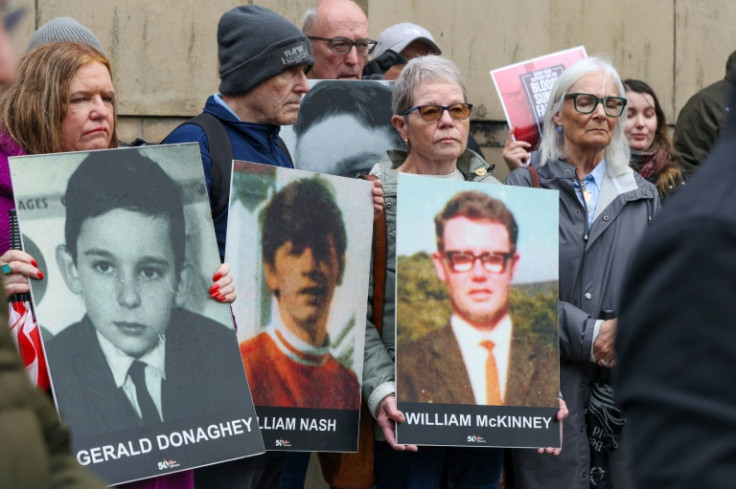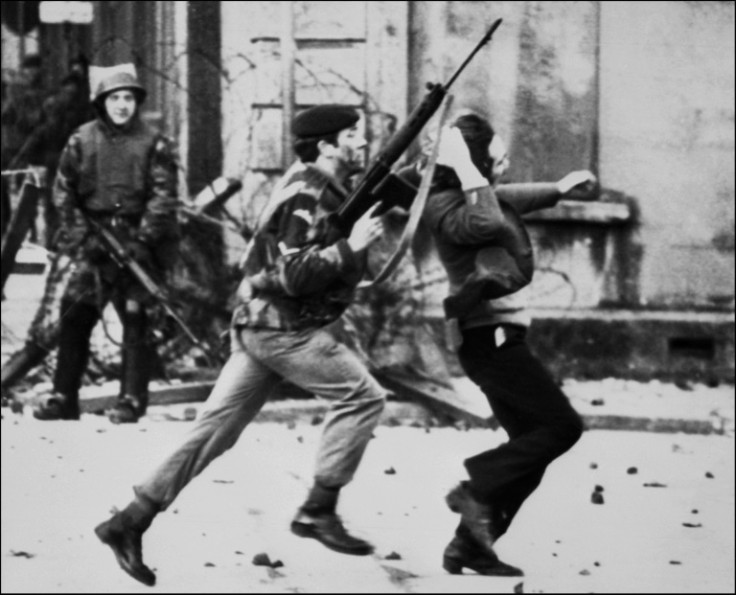Judge Clears British Ex-soldier Of Bloody Sunday Murders

A Belfast judge on Thursday acquitted a British ex-paratrooper of killing unarmed civilians during the 1972 Bloody Sunday massacre, a verdict condemned by victims' relatives and Northern Ireland's political leader.
The case is deeply divisive in Northern Ireland, where three decades of sectarian violence known as "The Troubles" still cast a long shadow, even after a peace deal was brokered in 1998.
British troops opened fire on civil rights protesters in the majority-Catholic Bogside area of Londonderry -- also known as Derry to pro-Irish nationalists -- on January 30, 1972, killing 13 people.
A 14th victim later died of his wounds.
Judge Patrick Lynch told the court he was satisfied there had been an intention to kill but that the prosecution had failed to "establish by whose hand the fatal shots were fired".
"I find the accused not guilty on all seven counts," he said, acquitting him of two charges of murder and five of attempted murder during one of the most bitterly contested events of the Troubles that began in the late 1960s.
The former soldier, identified only as Soldier F, listened to the verdict from behind a thick blue curtain, hidden from view in the packed courtroom.
He had been charged with murdering civilians James Wray and William McKinney, and attempting to murder five others during the crackdown on the civil rights protest.
It was one of the bloodiest incidents in Troubles, during which around 3,500 people were killed.
Bloody Sunday galvanised support for the Provisional IRA, the main paramilitary organisation fighting for a united Ireland and against British rule in Northern Ireland.
Northern Ireland's First Minister Michelle O'Neill, who is vice president of the Sinn Fein pro-Irish unity party, rejected the verdicts.
"The continued denial of justice for the Bloody Sunday families is deeply disappointing," she said on X.
Families of the Bloody Sunday dead reacted with anger outside court.
"Soldier F created two young widows on Bloody Sunday, he orphaned 12 children and he deprived dozens of siblings of a loving brother," said Mickey McKinney, the brother of one of the victims.
The families did "not lay the blame for today's decision" on the judge or the court, he said.
"The blame lies firmly with the British state, with the RUC (Northern Irish police) who failed to investigate the murders on Bloody Sunday properly, or indeed at all," he added.
Leader of the unionist DUP political party Gavin Robinson, however, urged the drawing of a line under the events of 1972.
"The vast majority of those who served in our armed forces did so with honour and often at great personal cost," he said.
"There must be no rewriting of the past and we will continue to guard against all attempts to do so," he said.
During the month-long trial that ended last week, Soldier F remained anonymous at his request.
In previous interviews, he told police he no longer had a reliable recollection of the events and was not called to give evidence in his own defence during the trial.
The prosecution brought the case on the basis that the shootings were "unjustified" and argued it was "implausible" that Soldier F could not recall whether or not he opened fire during the incident.
Northern Irish prosecutors first recommended Soldier F stand trial in 2019.
A 1972 inquiry into the killings cleared the soldiers of culpability but was widely seen by Catholics as a whitewash.
That probe, the Widgery Tribunal, closed off prosecutions, and only after the 1998 peace accords was a new investigation, known as the Saville Inquiry, opened.
That 12-year public inquiry -- the largest investigation in UK legal history -- concluded in 2010 that British paratroopers had lost control and that none of the victims had posed a threat.
The probe prompted then prime minister David Cameron to issue a formal apology for the killings, calling them "unjustified and unjustifiable".
Northern Irish police then began a murder investigation and submitted their files to prosecutors in 2016.
The case against Soldier F faced multiple delays, and bringing other ex-soldiers to trial is widely seen as unlikely.
The verdict comes after the UK government last month announced it would introduce a new act designed to deal with the legacy of the Troubles, paving the way for halted inquests to resume.
"We are committed to finding a way forward that acknowledges the past, whilst supporting those who served their country during an incredibly difficult period in Northern Ireland's history," a UK government spokesperson said Thursday.

© Copyright AFP 2026. All rights reserved.





















